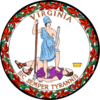Rossie Alston
2019 - Present
5
Rossie David Alston, Jr. is a judge on the United States District Court for the Eastern District of Virginia. On June 18, 2018, President Donald Trump (R) nominated Alston to a seat on this court.[1] The U.S. Senate confirmed Alston on June 10, 2019, on a 75-20 vote.[2] He received commission on June 12, 2019.[3] To see a full list of judges appointed by Donald Trump, click here.
The United States District Court for the Eastern District of Virginia is one of 94 U.S. district courts. They are the general trial courts of the United States federal courts. To learn more about the court, click here.
Alston was a judge on the Virginia Court of Appeals from 2009 to 2019.[4] He was elected to the court by the Virginia General Assembly on February 11, 2009.[5]
Judicial nominations and appointments
United States District Court for the Eastern District of Virginia
- See also: Federal judges nominated by Donald Trump
President Donald Trump (R) nominated Alston to a seat on the U.S. District Court for the Eastern District of Virginia on June 18, 2018. He was confirmed by a 75-20 vote of the U.S. Senate on June 10, 2019.[1][2] To read more about the federal nominations process, click here.
| Nominee Information |
|---|
| Name: Rossie Alston |
| Court: United States District Court for the Eastern District of Virginia |
| Progress |
| Confirmed 357 days after nomination. |
| Questionnaire: Questionnaire |
| QFRs: QFRs (Hover over QFRs to read more) |
Confirmation vote
The U.S. Senate confirmed Alston on June 10, 2019, on a vote of 75-20.[2] To see a full breakdown of the vote on the official U.S. Senate website, click here.
| Alston confirmation vote (June 10, 2019) | |||||||||
|---|---|---|---|---|---|---|---|---|---|
| Party | Yea | Nay | No vote | ||||||
| 23 | 19 | 3 | |||||||
| 51 | 0 | 2 | |||||||
| 1 | 1 | 0 | |||||||
| Total | 75 | 20 | 5 | ||||||
Change in Senate rules
Alston was confirmed to a U.S. District Court under a new precedent the Senate established.
On April 3, 2019, the U.S. Senate voted 51-48 in favor of a change to chamber precedent lowering the maximum time allowed for debate on executive nominees to posts below the Cabinet level and on nominees to district court judgeships from 30 hours after invoking cloture to two.[6]
The change was passed under a procedure, often referred to as the nuclear option, that requires 51 votes rather than 60.[7]
It was the third use of the nuclear option in Senate history. In 2013, it was used to eliminate the 60-vote threshold to confirm presidential nominees, except those to the Supreme Court. In 2017, it was used to eliminate the 60-vote threshold required to confirm Supreme Court nominees.[8] For more, see Filibuster and reconciliation in the United States Congress.
Senate Judiciary Committee hearing
The Senate Judiciary Committee held hearings on Alston's nomination on October 10, 2018.[1]
The Senate Judiciary Committee favorably reported Alston's nomination on February 7, 2019. Sen. Lindsey Graham (R-S.C.) reported the nomination.[2]
Nomination
Alston was nominated to succeed Judge Gerald Lee, who retired from judicial service on September 30, 2017.[2]
At the sine die adjournment of the 115th Congress on January 3, 2019, the Senate returned Alston's nomination to President Trump.[9] Alston was one of 51 individuals the president re-nominated on January 23, 2019.[10]
The American Bar Association rated Alston qualified by a majority and well qualified by a minority for the position.[11] To read more about ABA ratings, click here.
Education
Alston received his undergraduate degree, cum laude, from Averett University in 1979 and his J.D., cum laude, from North Carolina Central University School of Law in 1982. During his legal studies, Alston was a member of the law review and served as an editor of the North Carolina Law Journal.[5][12]
Career
- 2019-present: Judge, U.S. District Court for the Eastern District of Virginia
- 2009-2019: Judge, Virginia Court of Appeals
- 2001-2009: Judge, 31st Judicial District Court
- 2007-2009: Chief judge
- 1998-2001: Judge, Prince William County District Court
- 1989-1998:
- Attorney, Private practice
- Commissioner in chancery
- Substitute Judge
- 1984-1989: Attorney, National Right to Work Legal Defense Foundation
- 1982-1984: Staff attorney, National Labor Relations Board[5][13][12]
Noteworthy cases
Curtin v. Virginia State Board of Elections (2020)
Curtin v. Virginia State Board of Elections: On May 29, 2020, Judge Rossie Alston, of the United States District Court for the Eastern District of Virginia, rejected a challenge to Virginia's temporary expansion of absentee voting eligibility in the state's May and June elections. The state department of elections had advised local registrars that all voters could cite disability or illness as their reason for requesting absentee ballots, in light of the COVID-19 outbreak. The plaintiffs alleged that state officials had exceeded their authority in doing this and that such expansion would increase the number of votes cast unlawfully, thereby diluting the impact of votes cast lawfully. The plaintiffs requested that the court issue a preliminary injunction barring officials from implementing the policy. Alston rejected the motion: "Undermining belief in the purity of the electoral process, whether by inappropriately facilitating the participation of some or by diluting the participation of others, inherently brings us to question the sanctity of the democratic process itself. The bottom-line here is that while the basis of Plaintiffs' Complaint may be well-founded, the Court is constrained at this time from remedying these constitutional grievances."[14]
In a statement, Attorney General Mark Herring (D) praised the ruling: "Now, Virginians will not have to make the difficult choice between keeping themselves and their loved ones safe or exercising their fundamental right to vote." The plaintiffs did not immediately comment on the outcome of their lawsuit or whether they intended to appeal.[15]
About the court
| Eastern District of Virginia |
|---|
| Fourth Circuit |

|
| Judgeships |
| Posts: 11 |
| Judges: 11 |
| Vacancies: 0 |
| Judges |
| Chief: Mark Davis |
| Active judges: Arenda L. Wright Allen, Rossie Alston, Leonie Brinkema, Mark Davis, Patricia Tolliver Giles, Elizabeth Hanes, M. Hannah Lauck, Michael Nachmanoff, David J. Novak, Jamar Walker, Roderick Charles Young Senior judges: |
The United States District Court for the Eastern District of Virginia is one of 94 United States district courts. It is one of two federal district courts serving the commonwealth of Virginia. When decisions of the court are appealed, they are appealed to the United States Court of Appeals for the Fourth Circuit based in downtown Richmond, Virginia, at the Lewis F. Powell Federal Courthouse.
The Eastern District of Virginia has original jurisdiction over cases filed within its jurisdiction. These cases can include civil and criminal matters that fall under federal law.
The Eastern District of Virginia court's jurisdiction covers slightly over six million people, comprising approximately 85 percent of the state's population.
There are four court divisions, each covering the following counties and cities:
The Alexandria Division, covering Arlington, Fairfax, Fauquier, Loudoun, Prince William and Stafford counties, in addition to the cities of Alexandria, Fairfax, Falls Church, Manassas, and Manassas Park.
The Newport Division, covering Gloucester, James City, Mathews and York counties, in addition to the cities of Newport News, Hampton, Poquoson, and Williamsburg.
The Norfolk Division, covering Accomack, Isle of Wight, Northampton and Southampton counties, in addition to the cities of Cape Charles, Chesapeake, Franklin, Norfolk, Portsmouth, Suffolk, and Virginia Beach.
The Richmond Division, covering Amelia, Brunswick, Caroline, Charles City, Chesterfield, Dinwiddie, Essex, Goochland, Greensville, Hanover, Henrico, King and Queen, King George, King William, Lancaster, Lunenburg, Mecklenburg, Middlesex, New Kent, Northumberland, Nottoway, Powhatan, Prince Edward, Prince George, Richmond, Spotsylvania, Surry, Sussex and Westmoreland counties, in addition to the cities of Colonial Heights, Emporia, Fredericksburg, Hopewell, Petersburg, and Richmond.
The federal nomination process
Federal judges are nominated by the president of the United States and confirmed by the Senate. There are multiple steps to the process:
- The president nominates an individual for a judicial seat.
- The nominee fills out a questionnaire and is reviewed by the Senate Judiciary Committee.
- The Senate Judiciary Committee holds a hearing with the nominee, questioning them about things like their judicial philosophy, past rulings or opinions, etc.
- As part of this process, the committee sends a blue slip to senators from the home state in which the judicial nomination was received, allowing them to express their approval or disapproval of the nominee.
- After the hearing, the Senate Judiciary Committee will vote to approve or return the nominee.
- If approved, the nominee is voted on by the full Senate.
- If the Committee votes to return the nominee to the president, the president has the opportunity to re-nominate the individual.
- The Senate holds a vote on the candidate.
- If the Senate confirms the nomination, the nominee receives a commission to serve a lifelong position as a federal judge.
- If the Senate does not confirm the nomination, that nominee does not become a judge.
See also
- United States District Court for the Eastern District of Virginia
- United States Court of Appeals for the 4th Circuit
External links
- Search Google News for this topic
- Biography from the Federal Judicial Center
- United States District Court for the Eastern District of Virginia
- United States Court of Appeals for the 4th Circuit
- Virginia's Judicial System - Court of Appeals of Virginia
Footnotes
- ↑ 1.0 1.1 1.2 Congress.gov, "PN2141 — Rossie David Alston Jr. — The Judiciary," accessed October 29, 2018
- ↑ 2.0 2.1 2.2 2.3 2.4 Congress.gov, "PN210 — Rossie David Alston Jr. — The Judiciary," accessed February 8, 2019
- ↑ Federal Judicial Center, "Alston, Rossie David, Jr.," accessed June 17, 2019
- ↑ Virginia's Judicial System, "Judges of the Court of Appeals of Virginia," accessed July 2, 2018
- ↑ 5.0 5.1 5.2 Inside NoVA.com, "Rossie Alston Jr. appointed state judgeship," February 12, 2009
- ↑ The Hill, "GOP triggers 'nuclear option' to speed up Trump picks," April 3, 2019
- ↑ Axios, "Senate GOP invokes 'nuclear option' to speed up confirmations of Trump nominees," April 3, 2019
- ↑ NBC News, "McConnell to use 'nuclear option' to confirm lower-level nominees," April 2, 2019
- ↑ Under Senate Rule XXXI, paragraph 6 of the Standing Rules of the Senate, pending nominations are returned to the president if the Senate adjourns sine die or recesses for more than 30 days. Congressional Research Service, "Senate Consideration of Presidential Nominations: Committee and Floor Procedure," April 11, 2017
- ↑ WhiteHouse.gov, "Nominations Sent to the Senate," January 23, 2019
- ↑ American Bar Association, "Ratings of Article III and Article IV judicial nominees, 115th Congress," accessed October 29, 2018
- ↑ 12.0 12.1 WhiteHouse.gov, "President Donald J. Trump Announces Fifteenth Wave of Judicial Nominees, Fourteenth Wave of United States Attorney Nominees, and Ninth Wave of United States Marshal Nominees," June 7, 2018
- ↑ Virginia Lawyers Weekly, "Alston is elected to court of appeals," February 16, 2009
- ↑ United States District Court for the Eastern District of Virginia, "Curtin v. Virginia State Board of Elections: Order," May 29, 2020
- ↑ Richmond Times-Dispatch, "Federal judge denies complaint against Virginia officials over absentee voting rules," May 29, 2020
| Political offices | ||
|---|---|---|
| Preceded by - |
United States District Court for the Eastern District of Virginia 2019-Present |
Succeeded by - |
| Preceded by - |
Virginia Court of Appeals 2009-2019 |
Succeeded by - |
| |||
|---|---|---|---|
| 2017 |
Thomas Parker • Elizabeth Branch • Neil Gorsuch • Amul Thapar • David C. Nye • John K. Bush • Kevin Newsom • Timothy J. Kelly • Ralph Erickson • Scott Palk • Trevor McFadden • Joan Larsen • Amy Coney Barrett • Allison Eid • Stephanos Bibas • Donald Coggins Jr. • Dabney Friedrich • Greg Katsas • Steven Grasz • Don Willett • James Ho • William L. Campbell Jr. • David Stras • Tilman E. Self III • Karen Gren Scholer • Terry A. Doughty • Claria Horn Boom • John Broomes • Rebecca Grady Jennings • Kyle Duncan • Kurt Engelhardt • Michael B. Brennan • Joel Carson • Robert Wier • Fernando Rodriguez Jr. • Annemarie Carney Axon • | ||
| 2018 |
Andrew Oldham • Amy St. Eve • Michael Scudder • John Nalbandian • Mark Bennett • Andrew Oldham • Britt Grant • Colm Connolly • Maryellen Noreika • Jill Otake • Jeffrey Beaverstock • Emily Coody Marks • Holly Lou Teeter • Julius Richardson • Charles B. Goodwin • Barry Ashe • Stan Baker • A. Marvin Quattlebaum Jr. • Terry F. Moorer • Susan Baxter • William Jung • Alan Albright • Dominic Lanza • Eric Tostrud • Charles Williams • Nancy E. Brasel • James Sweeney • Kari A. Dooley • Marilyn J. Horan • Robert Summerhays • Brett Kavanaugh • David Porter • Liles Burke • Michael Juneau • Peter Phipps • Lance Walker • Richard Sullivan • Eli Richardson • Ryan Nelson • Chad F. Kenney, Sr. • Susan Brnovich • William M. Ray, II • Jeremy Kernodle • Thomas Kleeh • J.P. Hanlon • Mark Norris • Jonathan Kobes • Michael Brown • David Counts | ||
| 2019 |
Eric Miller • Chad Readler • Eric Murphy • Neomi Rao • Paul Matey • Allison Jones Rushing • Bridget S. Bade • Roy Altman • Patrick Wyrick • Holly Brady • David Morales • Andrew Brasher • J. Campbell Barker • Rodolfo Ruiz • Daniel Domenico • Michael Truncale • Michael Park • Joseph Bianco • Raúl Arias-Marxuach • Daniel Collins • Joshua Wolson • Wendy Vitter • Kenneth Kiyul Lee • Kenneth Bell • Stephen Clark • Howard Nielson • Rodney Smith • Jean-Paul Boulee • Sarah Daggett Morrison • Rossie Alston • Pamela A. Barker • Corey Maze • Greg Guidry • Matthew Kacsmaryk • Allen Winsor • Carl Nichols • James Cain, Jr. • Tom Barber • J. Nicholas Ranjan • Clifton L. Corker • Peter Phipps • Daniel Bress • Damon Leichty • Wendy W. Berger • Peter Welte • Michael Liburdi • William Shaw Stickman • Mark Pittman • Karin J. Immergut • Jason Pulliam • Brantley Starr • Brian Buescher • James Wesley Hendrix • Timothy Reif • Martha Pacold • Sean Jordan • Mary Rowland • John M. Younge • Jeff Brown • Ada Brown • Steven Grimberg • Stephanie A. Gallagher • Steven Seeger • Stephanie Haines • Mary McElroy • David J. Novak • Frank W. Volk • Charles Eskridge • Rachel Kovner • Justin Walker • T. Kent Wetherell • Danielle Hunsaker • Lee Rudofsky • Jennifer Philpott Wilson • William Nardini • Steven Menashi • Robert J. Luck • Eric Komitee • Douglas Cole • John Sinatra • Sarah Pitlyk • Barbara Lagoa • Richard Myers II • Sherri Lydon • Patrick Bumatay • R. Austin Huffaker • Miller Baker • Anuraag Singhal • Karen Marston • Jodi Dishman • Mary Kay Vyskocil • Matthew McFarland • John Gallagher • Bernard Jones • Kea Riggs • Robert J. Colville • Stephanie Dawkins Davis • Gary R. Brown • David Barlow • Lewis Liman | ||
| 2020 |
Lawrence VanDyke • Daniel Traynor • John Kness • Joshua Kindred • Philip Halpern • Silvia Carreno-Coll • Scott Rash • John Heil • Anna Manasco • John L. Badalamenti • Drew Tipton • Andrew Brasher • Cory Wilson • Scott Hardy • David Joseph • Matthew Schelp • John Cronan • Justin Walker • Brett H. Ludwig • Christy Wiegand • Thomas Cullen • Diane Gujarati • Stanley Blumenfeld • Mark Scarsi • John Holcomb • Stephen P. McGlynn • Todd Robinson • Hala Jarbou • David Dugan • Iain D. Johnston • Franklin U. Valderrama • John Hinderaker • Roderick Young • Michael Newman • Aileen Cannon • James Knepp • Kathryn Kimball Mizelle • Benjamin Beaton • Kristi Johnson • Toby Crouse • Philip Calabrese • Taylor McNeel • Thomas Kirsch • Stephen Vaden • Katherine Crytzer • Fernando Aenlle-Rocha • Charles Atchley • Joseph Dawson | ||
| |||
|---|---|---|---|
| Current |
| ||
| Former | Lawrence Koontz • Steven Agee • Leroy Millette • Larry Elder (Virginia) • Robert Frank (Virginia) • Robert Humphreys • D. Arthur Kelsey • Elizabeth McClanahan • James Haley • William Petty • Cleo Powell • Sam Coleman (Virginia) • Jere Willis • Rosemarie Annunziata • Rudolph Bumgardner • Jean Clements • Rossie Alston • Walter Felton • Teresa M. Chafin • Stephen R. McCullough • Thomas P. Mann • Johanna L. Fitzpatrick • Wesley G. Russell Jr. • | ||
Federal courts:
Fourth Circuit Court of Appeals • U.S. District Court: Eastern District of Virginia, Western District of Virginia • U.S. Bankruptcy Court: Eastern District of Virginia, Western District of Virginia
State courts:
Virginia Supreme Court • Virginia Court of Appeals • Virginia Circuit Courts • Virginia District Courts • Virginia Magistrates
State resources:
Courts in Virginia • Virginia judicial elections • Judicial selection in Virginia







